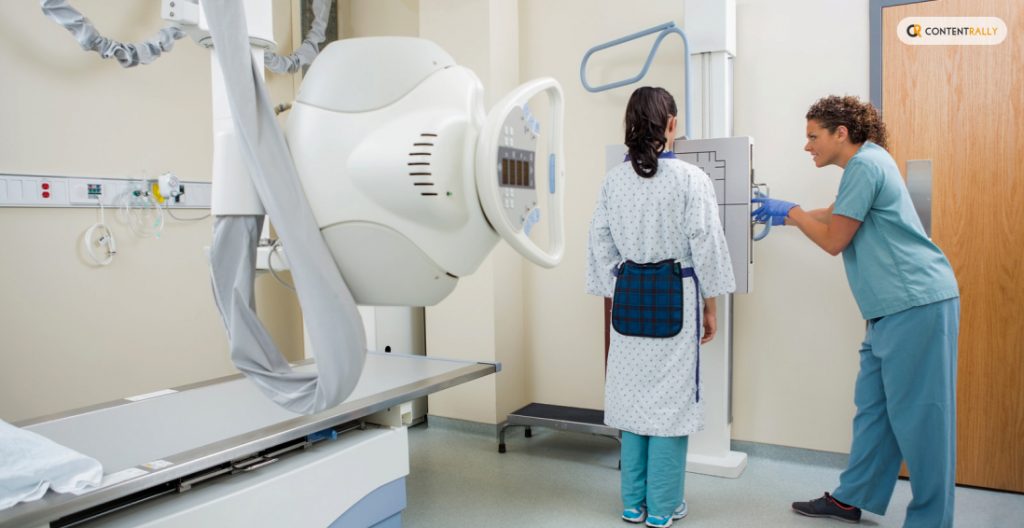How to become a radiology tech? You can start your career by getting an associate degree in radiology.
However, if you get an advanced degree, you can qualify for leadership roles. Then, you must consider specializing in a radiology area. Moreover, you must earn a certification from ARRT if you want to get a state license.
In this article, you will learn about how to become a radiology tech and pursue a career in the field. This article also guides you through the factors you must consider as you prepare to become a radiology tech.
Finally, you will get a step-by-step guide on pursuing a career as a radiology tech. Hence, to learn more, read on to the end of the article.
How to Become a Radiology Tech? – A General Overview

Generally, a radiology tech performs important diagnostic imaging procedures. Also, they perform scans to get a better idea of a patient’s health condition. This helps radiologists and physicians better. If this job seems interesting to you, you must consider pursuing a career as a radiology tech.
However, you must understand the different requirements for becoming a radiology tech. This can help you successfully land a job at a reputed place.
A radiology tech is a healthcare professional who helps in finding out health issues with patients. If you become a radiology tech, you have to operate X-rays and other medical imaging tech to find out problems.
Moreover, you will have other duties as well. For instance, you might need to explain radiology procedures to patients and handle complex imaging machines. Moreover, you also need to ensure the compliance of safety protocols.
According to the US Bureau of Labor Survey, the average radiology tech salary is $73,410 (2023 data). Moreover, you will have better-earning potential with some radiology tech specializations like MRI scanning, nuclear medicine, radiation therapists, etc.
Radiology Tech Specializations
Once you pursue a career as a radiology tech, you must have one or more specializations.
Some specializations include:
- Medical Imaging like X-rays, CT Scans, MRI, and mammography
- Nuclear Medicine
To become a radiologist technician, you must complete a high school diploma and then pursue a radiology program. Then, after you choose your specialization, you must get a radiographer certification. After that, you can prepare your resume and then apply for jobs.
How To Become A Radiology Tech? – Factors To Consider

If you want a service in the healthcare industry and also want plenty of contact with patients, you will enjoy a career as a radiology tech. In fact, to start working, you just need an associate degree in radiology or a similar field.
However, if you want early success in this career, you must have an eye for detail. Also, having good math and technical skills will help you grow a lot. Apart from that, you need to show a compassionate outlook.
On the other hand, this is actually a physically demanding job. Apart from that, this field is constantly evolving. Hence, if you have more stamina than others and you can adapt to different conditions, you can succeed in this job.
The following are the major factors you must consider if you want to know how to become a radiology tech:
Radiology Tech Job Description
As a radiographer, you might practice radiography or specialize in different medical imaging techniques. Actually, you have to work with doctors and radiologists to produce images of patients’s organs.
The following are some of the major tasks you will need to do as a radiology tech:
- Prepare patients for radiology tests. Also, you must explain the procedure to them and make them remove metal objects from their body.
- Perform tests like X-ray exams, mammograms, MRI scans, etc.
- Sometimes, you must review patient histories, doctor reports, charts, etc.
- Position patients and align them with machines. Additionally, you must calibrate machines to accurately produce images.
- Moreover, you must follow safety protocols and shielding devices. This way, you can save yourself, patients, and other coworkers from harmful radiation.
- You must check the clarity of images and explain them to doctors in your team.
- Since you know the correct procedure to use equipment, you need to sterilize and store imaging equipment accordingly.
- You must control radiology tech equipment in such a way as to produce accurate images with enough density and detail.
- Stay updated about radiation equipment and its safety measures. Also, you must learn how to use protection devices.
- You must have basic information about state and federal regulations and the policies of medical institutions. This way, you can ensure compliance with those regulations and policies.
Radiology Technician (Xray Tech) Specializations
Here are the major specializations of a radiology tech out of which you need to choose yours:
- X-rays
- Computed tomography (CT)
- Magnetic resonance imaging (MRI)
- Sonography
- Bone densitometry
- Nuclear medicine
- Vascular interventional radiography
- Mammography
- Cardiac-interventional radiography
Essential Qualifications And Education
To become a radiology tech, you can take different educational approaches. This is because there are several pathways to explore.
The following are some of the most popular options to consider:
🎓LXMO Certificates
You need almost a year to complete LXMO certificates. Basically, with the help of these certifications, you can quickly become a radiology tech. However, there are some drawbacks to consider.
For instance, if you have something less than an associate degree, you cannot earn an ARRT certificate. As a result, you will not qualify for a radiology tech license in some states.
🎓Associate Degrees
Generally, associate programs are for two years. Once you complete them, you can get a good exposure to radiology technology. Apart from that, these programs also include hands-on clinical experience and general education classes.
🎓Practitioner Certificates
A degree course takes a lot of time and effort. Hence, radiology tech expands their qualification by earning certificates with specializations. However, these certificates are for practicing individuals and not starters in the field.
🎓Bachelor’s Degree
A four-year degree in radiology technology will give you a deep dive into medical imaging. Also, you can develop a big picture in the radiology field. Also, you will gain various communication and analytical skills. Hence, you will be ready for managerial and supervisory roles.
🎓Master’s Degree
If you want to pursue further studies in the field of radiology technology, a Master’s Degree is the way forward. This will prepare you to pursue extensive knowledge in the subject. Also, you can be prepared for leadership and advanced practice. Moreover, you will have a chance to become a registered radiologist assistant.
How To Become A Radiology Tech? – Steps To Follow

To become a radiology tech, follow the steps below:
1. Pass a Diploma or an Equivalent Program
Here, you just need to earn a high school diploma or the GED test. Moreover, you will benefit from taking classes in the PCMB (Physics, Chemistry, Math, and Biology). Once you have a solid background in these subjects, you will have a better understanding of radiology and its technologies.
Moreover, you can consider volunteering at a healthcare center. This will help you understand the work environment.
2. Complete an Accredited Radiology Program
Many medical facilities and employers look for radiology tech with formal education and certification. Hence, you must pursue a hospital-based or college-based program with JRCERT accreditation.
Hence, you must consider getting a two-year associate degree in radiology tech. This will ensure you an entry-level position. However, for supervisory and administrative roles, you might need a Bachelor’s or a Master’s Degree.
After getting your specialization, you must complete your clinical training at a major hospital or a diagnostic center. This will help you to get placements after you complete your training.
3. Earn A Certification
To start working, you have to show a state board license along with an ARRT certification. However, to get this certification, you must have a Bachelor’s degree. Also, you must meet the ethical requirements of this certification.
Moreover, to maintain your certification, you must complete various continuing education courses in radiology and radiography. Furthermore, you can also choose advanced training as you complete the former.
4. Prepare Your Resume And Apply For Jobs
With the help of an effective resume, you can improve your chances of securing an interview. However, make sure you get tips on your resume from a professional. Additionally, ensure your resume is concise and has a professional summary of why you are the right person for the job.
Apart from that, your resume must also contain brief details about your skills, experience, and educational background. Moreover, you must also ensure that your resume is tailored to your job requirements.
Land Your Radiology Tech Job Now
You now know how to become a radiology tech. You have seen that these professionals perform multiple medical imaging procedures, CT scans, and X-rays.
However, as a radiology tech, you will be working with medical teams consisting of doctors, registered nurses, and other healthcare professionals. Hence, consider working on your communication skills.
Do you have more suggestions on how to become a radiology tech? Please share your ideas and opinions in the comments section below.
Read Also:























